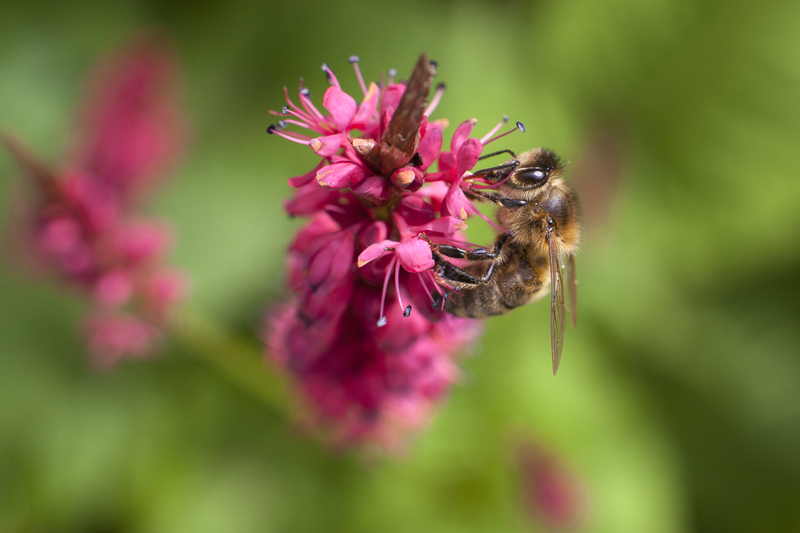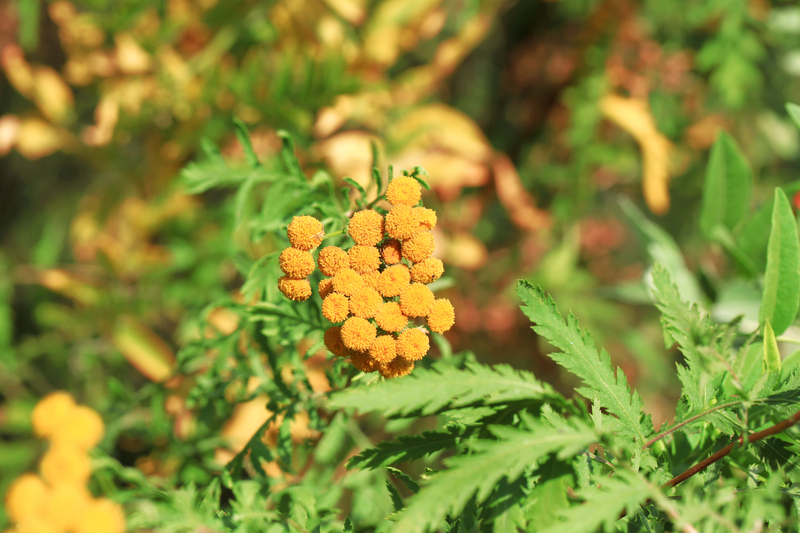Unlocking the Potential of Your New Herb Garden
Posted on 04/06/2025
Unlocking the Potential of Your New Herb Garden: A Comprehensive Guide
Have you just planted your first herb garden and are wondering how to get the most from it? With a new herb garden, a world of fresh flavors, health benefits, and natural beauty is at your fingertips. This in-depth guide will show you how to unlock the full potential of your new herb garden, whether it's in your backyard, on a balcony, or even on your kitchen windowsill.

Why Start a Herb Garden? Benefits Beyond the Kitchen
Your new herb garden is more than a culinary resource. These versatile plants offer a range of benefits, including:
- Fresh, organic ingredients for cooking and teas
- Medicinal and wellness uses--herbs like chamomile and mint can soothe and heal
- Natural fragrance and beauty--herb gardens are lovely to look at and pleasant to smell
- Support for pollinators--many herbs attract bees and beneficial insects
- Eco-friendly pest control--herbs like basil and rosemary repel pests naturally
Choosing the Right Herbs for Your Garden
When it comes to maximizing the value of your new herb garden, selecting the right herbs is crucial. Consider these factors:
- Climate and Sunlight: Most culinary herbs prefer at least 6 hours of sunlight a day. Choose plants that thrive in your local climate.
- Space: Determine if you have space for sprawling varieties like mint or compact herbs like chives and parsley.
- Your Needs: Think about which herbs you use often in cooking or herbal remedies.
Popular choices for beginners include:
- Basil - Great for Italian dishes, pesto, and salads.
- Rosemary - Perfect for roasting, teas, and even DIY natural cleaners.
- Mint - Refreshing in drinks, desserts, and for its soothing properties.
- Thyme - A hardy herb for savory dishes and marinades.
- Parsley - Versatile, nutrient-rich, and easy to grow.
- Cilantro - Essential for Mexican and Asian cooking.
Setting Up Your New Herb Garden for Success
Unlocking the full potential of your herb garden starts with a good setup. Whether you're growing herbs in the ground, raised beds, or containers, follow these essential tips:
-
Soil Quality:
- Use well-draining, nutrient-rich soil.
- Add organic matter like compost to improve fertility.
-
Sunshine:
- 6-8 hours of sunlight per day is optimal for most herbs.
- South-facing windows or patios work great for container gardens.
-
Watering:
- Herbs prefer slightly moist soil, but avoid soggy conditions.
- Water early in the day to minimize disease.
-
Spacing:
- Give each plant enough room to grow and for air to circulate.
- Follow package instructions or ask garden center experts if in doubt.
-
Labels:
- Label new plantings to avoid confusion before the herbs mature.
Maintaining and Caring for Your Herb Garden
A thriving herb garden demands a bit of ongoing care. Here's how you can maintain and maximize the potential of your new herb garden all year long:
Watering Tips
- Check soil moisture before watering. Most herbs prefer to dry out between waterings.
- Avoid watering the foliage--aim for the base of the plants to prevent mildew.
- Mulching helps retain soil moisture and reduce weeds.
Pruning and Harvesting
- Pinch off tips often--this encourages bushier, more productive growth.
- Harvest regularly--don't be afraid to use your herbs; regular cutting keeps plants vibrant.
- Never remove more than one-third of a plant at a time to avoid stress.
Pest and Disease Management
- Choose disease-resistant varieties when starting your herb garden.
- Keep foliage dry and ensure good air circulation to prevent fungal problems.
- Hand-pick pests or use gentle natural repellents like neem oil.
Creative Uses for Your Homegrown Herbs
Unlocking the potential of your new herb garden means finding ways to use your herbs beyond simple garnishes. Here are some creative ideas for making the most of your harvest:
Flavorful Kitchen Creations
- Herb-Infused Oils: Infuse olive oil with basil, rosemary, or thyme.
- Herbal Vinegars: Make tangy dressings with tarragon or chive blossom vinegar.
- Fresh Pesto and Chimichurri: Blend basil or parsley with garlic, nuts, and oil for a zesty sauce.
- Homemade Teas: Steep mint, lemon balm, or chamomile for soothing herbal teas.
- Compound Butters: Mix chopped herbs into butter for steak or bread spreads.
Natural Remedies and Wellness
- Mental Clarity: Use rosemary or sage in teas to enhance focus and memory.
- Digestive Health: Add mint or fennel to meals and teas for digestive relief.
- Relaxation: Use lavender or chamomile in bath sachets or teas for their calming effects.
Home Decor and Gifts
- Fresh Bouquets: Mix herbs like rosemary, sage, and thyme for a fragrant display.
- Sachets and Potpourris: Dry herbs for aromatic sachets to freshen drawers and closets.
- Herbal Wreaths: Craft decorative wreaths from sturdy herbs like bay and oregano.
- DIY Gifts: Package homegrown, dried herbs for thoughtful and eco-friendly gifts.
Preserving Herbs: Enjoying Year-Round Flavor
When your herb garden is flourishing, you may have more herbs than you can use fresh. Preserving your harvest ensures you unlock the full potential of your new herb garden all year long. Here's how:
Drying Herbs
- Air Drying: Tie small bunches of herbs and hang them upside down in a well-ventilated space away from direct light.
- Oven or Dehydrator: Use low temperatures to dry herbs quickly for culinary use.
- Crumble and Store: Once dry, remove leaves from stems and store in airtight containers.
Freezing Herbs
- Chop and Freeze: Chop fresh herbs and freeze them in ice cube trays with a little oil or water for convenient portions.
- Whole Leaf Freezing: Place leaves flat in a freezer bag for easy cooking use.
Herbal Infusions
- Herb Butters or Pastes: Mix finely chopped herbs into butter or oil and refrigerate or freeze.
- Syrups and Extracts: Make herbal syrups for cocktails, desserts, and marinades.
Expanding Your Herb Garden: Advanced Tips and Companion Planting
As you gain confidence, expand your herb garden's potential with advanced growing techniques:
Succession Planting
Stagger plantings for a continuous supply of fresh herbs throughout the growing season.
Indoor Herb Gardening
- Grow herbs indoors during winter or in small spaces using grow lights and well-draining pots.
- Choose compact varieties like basil, parsley, and cilantro for kitchen windowsills.
Companion Planting
Some herbs benefit your vegetable garden by attracting pollinators or deterring pests:
- Basil: Plant near tomatoes to improve flavor and repel insects.
- Chives: Grow near carrots for better growth and pest resistance.
- Dill: Attracts predatory insects that protect veggies.
Common Herb Garden Challenges and Solutions
Even the healthiest herb garden faces challenges. Here's how to troubleshoot:
- Bolting: Herbs like cilantro and basil can bolt (flower and go to seed) in hot weather. Harvest them early and often, and provide afternoon shade if possible.
- Yellowing Leaves: Usually signals over-watering or poor drainage. Adjust your watering routine and check soil conditions.
- Leggy Growth: Indicates inadequate sunlight. Move containers to a sunnier spot or trim back to encourage bushier growth.

Frequently Asked Questions on Unlocking the Potential of Your New Herb Garden
How often should I fertilize my herbs?
Herbs generally need less fertilizer than vegetables. A light feeding with compost or a balanced organic fertilizer every 4-6 weeks during peak growing season is enough to keep them healthy.
Can I grow herbs indoors all year?
Yes! Select sun-loving, compact herbs for best results, and provide grow lights to ensure sufficient light during the winter months.
How do I prevent herbs from taking over the garden?
Some herbs, like mint and lemon balm, can be invasive. Plant them in containers or use underground barriers to keep them in check.
When is the best time to harvest herbs?
Harvest in the morning, after dew dries but before temperatures rise. This is when essential oils--and therefore flavor--are at their peak.
Conclusion: Step Into a World of Fresh Flavor and Wellness
Unlocking the potential of your new herb garden is a rewarding journey. With a little planning, care, and creativity, you'll enjoy an abundance of fresh flavors and natural health all year long. Not only will your meals taste better, but you'll also experience the unique satisfaction that comes from growing your own herbs. Start small, experiment with new varieties, and let your herb garden inspire you to try new recipes, natural remedies, and beautiful home decor.
Your new herb garden is bursting with possibility--explore, experiment, and enjoy every leafy reward!
```Latest Posts
Inspiring Garden Seating Concepts for Ultimate Relaxation
Indispensable Tools for Every Gardener
Unveil serenity in your yard with Zen landscaping

